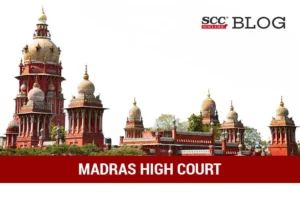Madras High Court: In a writ petition filed against the advertisement issued by Assistant Commissioner and the Executive Officer of Sri Sugavaneswarar Swamy Temple, calling for applications to fill up the position of Archakas/Sthanikam at Sri Sugavaneswarar Swamy Temple, N. Anand Venkatesh, J. reiterated that in the matter of appointment of an Archaka, the rule of next-in-line of succession cannot be insisted. Thus, any person belonging to any caste or creed can be appointed as an Archaka provided he is a well-versed and an accomplished person in the Agamas and rituals necessary to be performed in a temple.
Background:
The petitioner hails from the family of Sivachariyars and their family has been performing the poojas from time immemorial and the position of Sthanikam was occupied as a hereditary right. Accordingly, after his grandfather, the petitioner took over the position as Sthanikam and was performing the pooja.
The customs and usages were the basis for occupying the position as Sthanikam and every time when there is a change in the Sthanikam, a letter of intimation used to be given to the Authorities, who also granted approval subsequently.
The grievance of the petitioner is that respondents issued the impugned advertisement calling for applications for appointment to the position of Archakas/Sthanikam of the subject temple and that the impugned advertisement infringes upon the hereditary right of the petitioner and others, who are rendering their services as per the customs and usage in the line of succession from time immemorial.
Placing reliance on Seshammal v. State of T.N., (1972) 2 SCC 11, wherein it was held that the appointment of an ‘Archaka’ is a secular act and hence, the hereditary right cannot be claimed. Thus, in the matter of appointment of an Archaka, the rule of next-in-line of succession cannot be insisted and a trustee is not bound to make the appointment on the sole ground that the candidate is next-in-line of succession to the last holder of the office. However, the Archaka is expected to be a well-versed and an accomplished person in the Agamas and rituals necessary to be performed in a temple.
Hence, the Court rejected the petitioner’ claim to his right to the position of Sthanikam being next-in-line of succession.
The Court noted that in Seshammal (supra) the Supreme Court held that the religious service by an Archaka is the secular part of the religion, and the performance of the religious service is an integral part of the religion. Therefore, the prescription provided by the Agamas gains significance only when it comes to the performance of the religious service. Thus, any person belonging to any caste or creed can be appointed as an Archaka provided he is a well-versed and an accomplished person in the Agamas and rituals necessary to be performed in a temple.
The Court further said that when the impugned advertisement was issued, the same was governed by the Tamil Nadu Hindu Religious Institutions (Officers and Servants) Service Rules, 1964 (1964 Rules). The 1964 Rules have been replaced by the 2020 Rules. It will be a mere academic exercise to test the advertisement qua the 1964 Rules. Hence, the Court did not go into the legality of the impugned advertisement qua the 1964 Rules.
The Court noted that the temple in question is governed by Karanagama. Consequently, it is an Agamic temple where appointment of Archakas should be governed by the prescription provided by the Agama.
The Court said that it is always left open to the trustees/fit person to appoint Archakas/Sthanikam in Agamic temples by ensuring that the Archakas/Sthanikam are well-versed, properly trained and qualified to perform the pooja as per the requirements under the Agama. Further, the pedigree based on caste would have no role to play in the appointment of Archaka if the person so selected otherwise satisfies the requirements.
Placing reliance on All India Adi Saiva Sivacharyargal Seva Sangam v. State of T.N., 2022 SCC OnLine Mad 4154 the Court said that it is clear that the executive officer, who performs the functions of a trustee and the fit person, will also fall within the definition under Rule 2(g) of the 2020 Rules. Thus, the appointment can be made under the 2020 Rules by the trustees or the fit person or the executive officer, who is in charge of the affairs of the temple. Thus, it was held that the advertisement issued by the executive officer under the 2020 Rules cannot be questioned on the ground that he is an officer of the Department.
Thus, the Court said that while issuing an advertisement and calling for applications for appointment of Archakas/Sthanikam in Agamic temples, no reference shall be made to Rules 7 and 9 of the 2020 Rules and the appointment will be governed by the requirements under the Agama. Such requirements shall also be specifically stated in the advertisement. Further, it is left open to the Committee, which consists of experts in the field to satisfy themselves that the persons so selected fulfil the requirements prescribed by the Agama.
Further, it directed the executive officer of Sri Sugavaneswarar Swamy Temple, to issue an advertisement in line with this order and to appoint Archakas/Sthanikam for the Temple. The Court permitted the petitioner to perform the poojas till the appointment of the Archakas/Sthanikam and also allowed him to participate in the selection.
[Muthu Subramania Gurukkal v. The Commissioner, 2023 SCC OnLine Mad 4174, Order dated 26-06-2023]
Advocates who appeared in this case :
For Petitioner: Advocate R. Singaravelan;
For Respondents: Special Government Pleader N.R.R Arun Natarajan.

